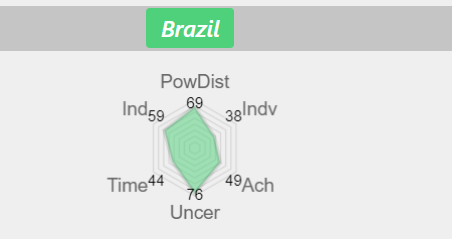Overview
Do we, as global citizens, understand the necessity of comprehending cultures? As an international student, we have a choice to decide who we collaborate with in certain projects or who we accept as a friend, but in a professional aspect, it’s more complicated than that. Brazilian doctors, for example, face a great deal of cultural related and language issues that they have to deal with one way or another.
Outcome
There was a heartbreaking situation where a Bantu couple’s son was diagnosed with Leukemia during their visit to Brazil, but they never fully understood what was wrong with their son since the doctors in Brazil failed to explain what was wrong even with the embassy’s aid and this was mainly because the word ‘Leukemia’ does not exist in the Bantu vocabulary. During such times, it’s unfortunate that a proper understanding of the current situation is not provided to some people which might have led to the death of their son.
Hofstede Dimension
https://tcps.institute/cultural_bridges_tool.html
Indigenous people, Africans, Haitians, and the elderly people of Pomerode require the most interpretation in Brazilian hospitals as their Portuguese language skills are not so great. Apart from language issues, there are other barriers, such as culture. Due to the colossal earthquake that occurred in 2010, a substantial number of Haitians moved to Brazil in search of making a living, but have not adapted to the different levels of power distance and mostly like other Hofstede dimensions as well. Hierarchy is highly respected, as observed in the usage of the honorific ‘Dr.’; however, one would expect the last name to follow and not the first name. Besides, this unique combination of Dr. + First name, Brazilian indirectness, and general chitchats before any formal meeting most likely clashes with the Haitian values and thought patterns. For instance, women will not speak directly during the doctor’s appointment if the doctor is a male as it’s prohibitive and inhibitive for women to speak out loud in the presence of men, and this itself can come across as a cultural shock for Brazilian doctors. In this case, her husband, father, or son will talk to the doctor but will fail to interpret the women’s feelings. This can be defined as a failure in communication as the sender omits vital information and the receiver (husband) reproduces incomplete information to the next receiver, who is the doctor, and this is due to the language barrier as well as the inability and the unwillingness of female patients to speak to the male doctor directly.
Possible Solutions
As a solution, it is wise to have a female assistant talk to the women since proper comfortable communication is necessary to diagnose the correct problem and give a suitable treatment. The Brazilian doctor we interviewed specifically mentioned: “communication is a therapeutic process,”, the art of medicine, so when culture is embedded in communication, we should deal with it accordingly. However, unfortunately, it is evident that some of his Brazilian coworkers who are doctors and upper in the hierarchy are reluctant to lower their power distance to establish communication with a refugee patient who does not speak Portuguese, and this leaves the immigrant patient vunerable. This action comes from the notion “this is not part of my job” or “Why would I waste my precious time with this one patient.” As doctors, they do care about the wellbeing of their patients but have limited time for the appointments and therefore would prefer if foreigners try to find solutions for language barriers. However, it is vital for a patient to receive the necessary aid regardless of any other barriers, and discrimination should be abandoned by the doctors.
Despite the lack of cooperation, hospitals do try to figure out a way to seek aid in interpretation. For example, they first see if the hospital has someone who speaks Creole or French and is willing to help the patient, then the patient accepts this person, and the informal interpretation happens. If the correct interpreter is not found, social services are contacted to request a Haitian interpreter to help, and this is a genuine way of obtaining the right person even during an emergency as the hospital has a good relationship with social services. Apart from that, translation apps are the only other immediate source used. Overall, it is unfortunate that hospitals do not have professionals capable of interpreting for patients, and as an external support, there are no Haitian consulates in Blumenau. As a best practice, it is good for doctors themselves to have intercultural communication training to become more aware of the influence of power distance and to focus on the art of medicine rather than just the science of it. To conclude, our case model showed the importance of culture during interpretation as well as the importance of having the right person to interpret. However, it is evident that Brazil does have the human resources necessary, but it has not utilized it to its full potential, and as a consequence, this is a big hindrance in the medical field for diagnosing and treating patients.
Authors
Pedro Henrique Salmeron: Block 2, Semester 1, 2020/2021
(LinkedIn)
Demi Thomas: Block 2, Semester 1, 2020/2021
(LinkedIn)
Jessica John Prabakar: Block 2, Semester 1, 2020/2021
(LinkedIn)
Mathys Bremond: Block 2, Semester 1, 2020/2021
(LinkedIn)
